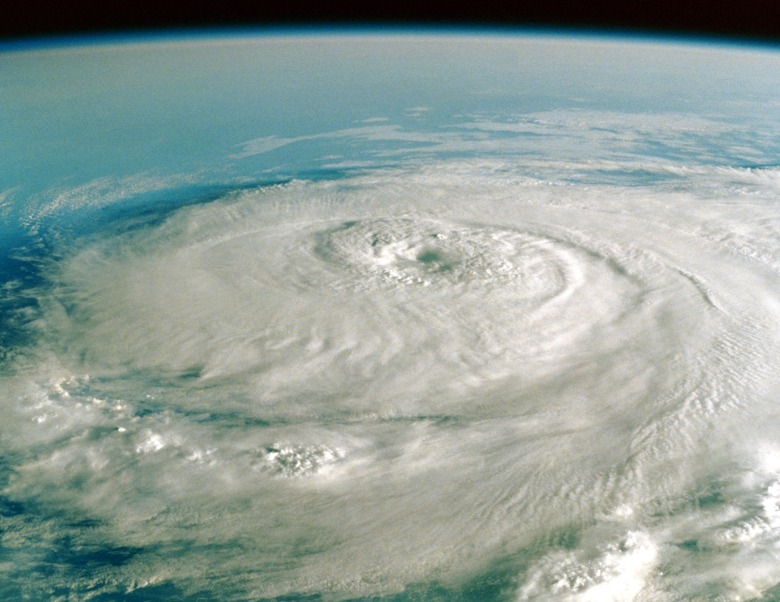Precautions During Cyclones
A cyclone is a generic word for a violent rotating storm that forms over tropical or subtropical waters, characterized by high winds in excess of 200 kilometers per hour and heavy, flooding rains. These conditions can cause severe property damage and increased risk of drowning, as well as severe injury or death from flying debris. Sea levels can also rise, causing a storm surge that can threaten communities by cutting off evacuation routes. The terms "hurricane" and "typhoon" are regional names for the same type of storm, while "tropical depression" and "tropical storm" are used to describe milder storms of the same nature. Certain precautions should be taken by anyone that lives in cyclone-prone areas to ensure safety and minimize property damage.
Be Prepared
Be Prepared
It goes without saying that the better prepared you are before the storm hits, the better your odds of getting through it. Recommended preparations include trimming overhanging branches and removing all loose items from around your property that could become deadly projectiles. Metal window shutters will prevent blown-in windows that can cause serious injuries. Spare fuel should be kept in the event of an evacuation, as well as an emergency water supply. An item of major importance to have handy is an emergency kit with a radio, batteries, flashlights, nonperishable foods, candles, matches, any important documents, essential medications, waterproof bags and a first-aid kit. Having an evacuation plan, in the event that it becomes necessary, is something that should be considered by every household living in cyclone-prone areas.
Watches and Warnings
Watches and Warnings
Cyclone watches and warnings are issued well in advance by meteorologists who are constantly monitoring the weather patterns around the globe. If your area should receive one, take special care to listen closely to the developing situation, so that you are not caught off guard. This is a good time to check your emergency kit and make sure it is stocked and accessible. Take the time to talk to your neighbors and warn them, in case they haven't heard. Check to make sure you have drinkable water, in the event that the water supply is restricted. Also, be sure to withdraw some emergency cash and remember that ATMs and banks may become inaccessible due to possible power failures.
During the Storm
During the Storm
If you have not been forced to evacuate or have decided to stay home and wait out the storm, the most important thing to remember is to stay indoors. Unplug all your appliances to avoid electrocution hazards if water begins to enter your home. Turn off all electricity, gas and water. Keep your emergency kit close and keep yourself and your family in the strongest part of the house, away from all windows and doors. Keep the battery-powered radio going to listen for any updates on the situation and if your home or building begins to break up, get under a strong bench or table to protect yourself from the elements and any falling debris that might collapse onto you. Remember that the eye of the storm is calm and could mislead you into thinking that the worst is over, when in fact it is still not safe to go outside. Wait for the official word that the storm is over, before leaving the safety of your home. If you have to evacuate ahead of the storm, be sure to lock up your home, turn off gas, electricity, and water, and be sure to take your emergency kit, cash and suitable clothing when you leave.
Aftermath
Aftermath
Just because the storm is over does not mean that all of the danger has subsided. Remember that you can still be injured or killed by falling debris from damaged buildings or downed power lines in the streets. If you left your home to seek shelter or due to an evacuation, take only the recommended routes home. These routes have either been checked and cleaned up, or otherwise deemed safe for passage. Check on your neighbors to make sure they are not hurt or in need of assistance, but avoid careless sightseeing. Do not use any wet appliances until they have been checked and boil all your water until you receive official word that the water supply is clean and safe to drink. Do not wade through flood waters. Remember that all sorts of unseen hazards can be lurking underwater, from downed power lines to sharp objects or sinkholes.
Cite This Article
MLA
Abbott, Mark. "Precautions During Cyclones" sciencing.com, https://www.sciencing.com/precautions-during-cyclones-12571673/. 18 October 2017.
APA
Abbott, Mark. (2017, October 18). Precautions During Cyclones. sciencing.com. Retrieved from https://www.sciencing.com/precautions-during-cyclones-12571673/
Chicago
Abbott, Mark. Precautions During Cyclones last modified March 24, 2022. https://www.sciencing.com/precautions-during-cyclones-12571673/
